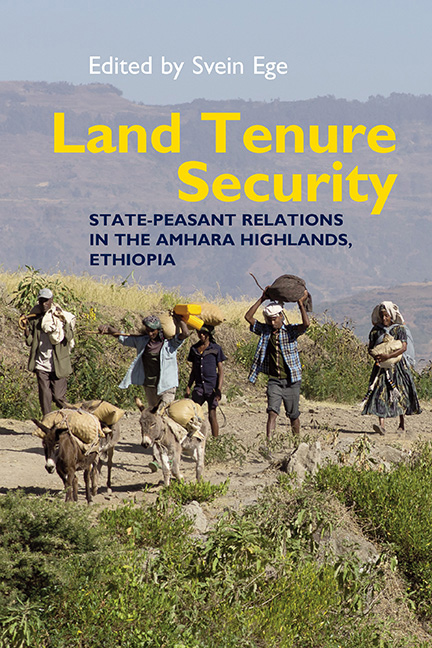Book contents
- Frontmatter
- Dedication
- Contents
- List of Illustrations
- Note on Transliteration
- Dates and Measures
- Contributors
- Preface
- Glossary
- Map
- 1 Introduction
- 2 Peasant Land Tenure: A Critical Review
- 3 The Dersha System: Rethinking Land Tenure under the Därg
- 4 Land Tenure in Gojam under the Därg
- 5 Land Tenure in Baba Säat, North Wälo
- 6 Rich and Poor: Land and Wealth in Mäqét, North Wälo
- 7 Rural Land and Urban Aspirations: Future Orientation in a Time of Change
- 8 An Unstable Land Tenure System
- 9 Conclusion
- Postface
- Select Bibliography
- Index
- Eastern African Studies
Postface
Published online by Cambridge University Press: 26 March 2019
- Frontmatter
- Dedication
- Contents
- List of Illustrations
- Note on Transliteration
- Dates and Measures
- Contributors
- Preface
- Glossary
- Map
- 1 Introduction
- 2 Peasant Land Tenure: A Critical Review
- 3 The Dersha System: Rethinking Land Tenure under the Därg
- 4 Land Tenure in Gojam under the Därg
- 5 Land Tenure in Baba Säat, North Wälo
- 6 Rich and Poor: Land and Wealth in Mäqét, North Wälo
- 7 Rural Land and Urban Aspirations: Future Orientation in a Time of Change
- 8 An Unstable Land Tenure System
- 9 Conclusion
- Postface
- Select Bibliography
- Index
- Eastern African Studies
Summary
This book is about peasant agriculture in Africa, the dominant production regime of the continent. The average size of African farm holdings is declining over time, representing a threat to peasant farmers. In a survey of landholdings in Ethiopia, Malawi, Kenya, Mozambique, Rwanda and Zambia, it was found that 25 per cent of small-scale farming households were approaching landlessness (Jayne et al. 2010). This finding challenges the general claims of the high availability of unused or under-used land in the region.
Beyond size, there are wide variations among smallholder farmers in Sub-Saharan Africa. Some could be described as rural residents, since they mainly farm for subsistence. Others cultivate chiefly for the market and are commercially oriented. In practice, they may function as enterprises and may be highly productive both in terms of labour and land productivities. Research from several African countries indicate that about 10 per cent of the smallholders belong to this category (Djurfeldt et al. 2005). There are many variations between these extremes.
Land tenure is a critical factor for peasant farming regimes. On the production side, land tenure has implications both for agricultural yields (i.e. production per unit of land) and for agricultural labour productivity (i.e. production per peasant). It is important to distinguish between these two productivities for understanding the potential role of agriculture to contribute to the development of other sectors of the economy, as well as for its implications for labour absorption and migratory flows. Agricultural yields do not reflect the surplus produced in agriculture. The latter is signalled by the labour productivity which, if positive, may contribute not only to the subsistence of rural people and inputs in the farm economy, such as seeds for the next season and fodder for animals (particularly important in the ox-ploughing peasant agriculture of the Ethiopian highlands), but also food and other products for the urban population, industries and exports. This helps us understand that it is not only the size of investments in agriculture that matters, but also their character. Of particular concern in Ethiopian- type economies is how investments can raise agricultural labour productivity in a labour-intensive manner, both through investments directly in production and in rural-based processing of crops and diversification of the rural economy. The issue of how peasant land tenure is related to investments, a central topic of this book, thus becomes highly pertinent.
- Type
- Chapter
- Information
- Land Tenure SecurityState-peasant relations in the Amhara Highlands, Ethiopia, pp. 159 - 164Publisher: Boydell & BrewerPrint publication year: 2019



